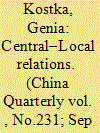| Srl | Item |
| 1 |
ID:
155663


|
|
|
|
|
| Summary/Abstract |
Recent literature on environmental governance in China frequently ascribes blame for China's environmental problems to sub-national governments' lax environmental enforcement. Such research implicitly assumes that more central control would lead to better results but, as yet, the role of the centre in environmental governance remains underresearched. In the context of the current phase of recentralization, this article studies central and local interests, capacities and interactions across policy issues and government agencies. By “bringing the centre back” into the study of central–local relations in China, we examine both where such recentralization has in fact occurred and whether such recentralization efforts have improved environmental outcomes. We argue that centralization does not improve outcomes in every case. Further, central and local levels of governance are not as different as they might seem. Indeed, there are significant areas of overlapping interests and similar patterns of behaviour, both positive (enforcement) and negative (shirking), between central and local administrations. The results draw an empirically and theoretically rich picture of central–local relations that highlights the innate complexity of China's environmental governance patterns during the current phase of recentralization.
|
|
|
|
|
|
|
|
|
|
|
|
|
|
|
|
| 2 |
ID:
181882


|
|
|
|
|
| Summary/Abstract |
This study analyzes the rise of DC/EP (digital currency electronic payment) in China by proposing the concept of “recentralized authoritarian capitalism.” It first examines how recentralized authoritarian capitalism started in 2010 in the form of a recentralizing of regulations. After considering how the fintech firms have restructured their shareholding in response to the recentralizing regulations, I delineate how these firms further strengthen recentralized authoritarian capitalism, as exemplified by how Alipay has helped realize the Party’s plan to launch DC/EP.
|
|
|
|
|
|
|
|
|
|
|
|
|
|
|
|
| 3 |
ID:
137431


|
|
|
|
|
| Summary/Abstract |
The Spanish executive centralized political power to manage the politics of austerity better in the aftermath of the Great Recession. This article analyzes the reinforcement of the power of the central government and argues that three explanatory variables—economic crisis, ideology, and party politics—account for recentralization, which is defined as fiscal consolidation, concentration of competences, bureaucratic rationalization, and ideological convergence. The debate about the motives and nature of recentralization (de jure vs. de facto) further polarized the center-periphery cleavage. Regional prosovereignty parties interpreted the reversal of decentralization as another sign that accommodation within Spain was not possible and that contestation was the way forward.
|
|
|
|
|
|
|
|
|
|
|
|
|
|
|
|